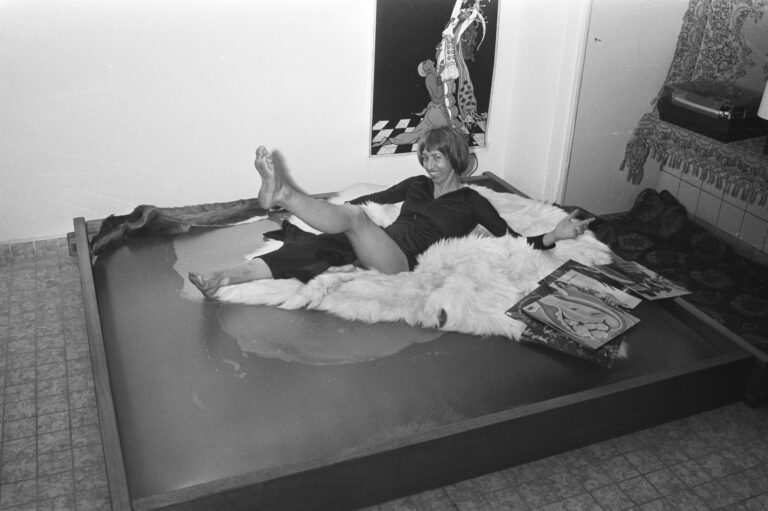Waterbeds were a popular bedroom staple in the 1970s and 1980s, but their popularity has certainly declined since then. However, that doesn’t necessarily mean that they’re no longer used by people today.
There are still many individuals who enjoy the unique feeling and benefits of sleeping on a waterbed. For example, waterbeds can help reduce pressure points on the body, provide excellent support for those with back pain, and offer a comfortable, cool sleeping surface during hot weather.
Moreover, many waterbed enthusiasts appreciate the fact that waterbeds can be customized to suit individual preferences, from the firmness of the bed to the temperature of the water. They can even be made with extra features, such as massage settings or built-in heating systems.
Of course, waterbeds are not for everyone, and they may not be the best choice for every sleeping situation. They can be more challenging to move or maintain than traditional mattresses, and they may not be as widely available in stores.
But if you’re someone who is curious about waterbeds or looking for a unique and comfortable sleeping experience, it’s worth considering the benefits that waterbeds can offer.
So, to answer your question: yes, people still use waterbeds! While they may not be as common as they once were, there are still plenty of waterbed enthusiasts out there who enjoy the benefits of this unique sleeping surface.
History of Waterbeds
Waterbeds may seem like a modern invention, but their history actually goes back several decades. In fact, the first waterbed was invented in 1833 by Scottish physician Dr. Neil Arnott!
However, it wasn’t until the late 1960s that waterbeds began to gain popularity as a mainstream consumer product. That’s when a design student named Charles Hall created a more comfortable and practical version of the waterbed, using vinyl and other materials to create a more stable and durable mattress.
By the 1970s, waterbeds had become a cultural icon, popularized in movies, TV shows, and music videos. They were seen as a symbol of the free-spirited, counter-culture movement of the time.
Despite their initial popularity, however, waterbeds began to decline in popularity in the 1980s and 1990s, as more traditional mattresses and bedding options became more widely available. Today, waterbeds are less common, but there are still many people who appreciate the unique comfort and benefits of sleeping on a waterbed.
Whether you’re a die-hard waterbed enthusiast or just curious about this unique sleeping surface, the history of waterbeds is a fascinating tale of innovation, creativity, and cultural change.
Waterbeds and Film
Waterbeds have had a long and interesting relationship with film, dating back to the 1970s when they first gained popularity as a mainstream consumer product.
During this time, waterbeds became a symbol of the free-spirited, counter-culture movement of the era. They were often depicted in films and TV shows as a luxurious and indulgent item, used by characters to express their rebellious, carefree lifestyles.
One of the most iconic uses of a waterbed in film is in the 1973 movie “American Graffiti”, where a character named Terry the Toad is seen lounging on a waterbed while listening to music. The scene captures the essence of the 1970s and the carefree, hedonistic attitudes of the time.
Waterbeds also appeared in other classic movies of the era, such as “The Love Machine” (1971) and “Fast Times at Ridgemont High” (1982). These films helped to establish waterbeds as a cultural icon, synonymous with the era’s attitudes towards sex, drugs, and rock and roll.
Today, waterbeds may be less common in popular culture, but they still hold a special place in the hearts of those who appreciate their unique comfort and benefits. And who knows? With the resurgence of retro and vintage styles in pop culture, we may see a renewed interest in waterbeds in film and beyond.

Waterbeds and Climate Control
Waterbeds can be designed to provide a cool sleeping surface, which is one of the reasons they can be a great choice for people who tend to sleep hot.
One of the key benefits of a waterbed is that it can be customized to the individual’s preferences, including the temperature of the water. This means that you can adjust the temperature to suit your specific needs, whether you prefer a cooler or warmer sleeping environment.
In addition to temperature control, waterbeds can also provide excellent support and pressure relief for the body. This is because the water in the bed conforms to the shape of your body, reducing pressure on your joints and spine. This can help to prevent aches and pains that can be caused by traditional mattresses that don’t conform as well to the body.
Overall, waterbeds can be an excellent choice for people who are looking for a comfortable and customizable sleeping surface that can help to regulate temperature and provide excellent support. So, if you tend to sleep hot and are looking for a way to stay cool and comfortable all night long, a waterbed may be just what you need!
Where to Buy Waterbeds
If you’re interested in buying a waterbed, you may be wondering where you can find them for sale. While waterbeds may not be as widely available as traditional mattresses, there are still several places where you can purchase them.
One option is to check with your local mattress stores. While not all mattress stores carry waterbeds, some do, and they may even have models available for you to try out before you buy.
Another option is to search online for waterbed retailers. There are several online stores that specialize in waterbeds and waterbed accessories, and they may offer a wider selection than you can find in a physical store.
You can also check with specialty bedding stores, as they may carry waterbeds or have information on where you can find them.
If you’re looking for a more affordable option, you may want to consider purchasing a used waterbed. You can often find them for sale on online marketplaces or in classified ads.
Overall, while waterbeds may not be as common as they once were, there are still several places where you can purchase them. So, if you’re interested in trying out a waterbed for yourself, start by checking with local mattress stores, specialty bedding stores, or online retailers.
Waterbed Brands and Pricing
Boyd Waterbeds:
- Resonance: $1,499.99
- Genesis: $1,999.99
- Free Flow: $2,499.99
Innomax:
- Sanctuary: $1,999.99
- Medallion: $2,499.99
- Genesis 400 Gentle Wave: $2,999.99
Strobel Organic:
- Sof-Frame: $1,499.99
- Super 8: $1,999.99
- Ultra Waveless: $2,499.99
Classic Sleep Products:
- Natural Expressions: $1,499.99
- Better Sleep 750: $1,999.99
- Luxury Support LS 9000: $2,499.99
American National Manufacturing:
- Softside: $1,499.99
- Hardside: $1,999.99
- Luxury Support: $2,499.99
Land and Sky:
- Dreamweaver: $1,499.99
- Ultra Waveless: $1,999.99
- Mystique: $2,499.99
Sterling Sleep Systems:
- 8600: $1,499.99
- 9000: $1,999.99
- 9500: $2,499.99
Comfort Craft:
- 5500: $1,499.99
- 6500: $1,999.99
- 7500: $2,499.99
Aqua Pedestal:
- UltraWaveless: $1,499.99
- MidFill: $1,999.99
- SuperSponge: $2,499.99
Genesis Series:
- 400: $1,499.99
- 500: $1,999.99
- 600: $2,499.99
Please note that these are just list prices and the actual prices may vary depending on the retailer.
Trial and Warranty
If you’re considering purchasing a waterbed, you may be wondering about the trial period and warranty that comes with the bed. Let’s take a closer look at what you can expect when it comes to waterbed trials and warranties.
Waterbed Trial Periods:
Many waterbed manufacturers offer trial periods that allow you to try out the bed for a certain period of time, usually ranging from 30 to 120 days. During this time, you can sleep on the bed and decide if it’s the right fit for you. If you’re not satisfied with the bed, you can return it for a full refund.
It’s important to note that trial periods may come with certain conditions, such as a requirement to keep the bed for a minimum period of time before returning it, or a requirement to pay for return shipping or restocking fees. Make sure you read the terms and conditions carefully before committing to a waterbed trial.
Waterbed Warranties:
Warranties for waterbeds can vary depending on the manufacturer and the model of the bed. Generally, waterbed warranties will cover defects in materials and workmanship for a certain period of time, usually ranging from 5 to 20 years.
It’s important to read the warranty carefully to understand what is covered and what is not. For example, some warranties may not cover damage caused by accidents, misuse, or normal wear and tear. Make sure you understand the terms and conditions of the warranty before making your purchase.
In addition to the warranty, you may also want to consider purchasing additional protection, such as a mattress protector or extended warranty, to further safeguard your investment.
Overall, waterbed trials and warranties can offer peace of mind when purchasing a new waterbed. By understanding the terms and conditions of the trial and warranty, you can make an informed decision and find a waterbed that meets your needs and budget.

